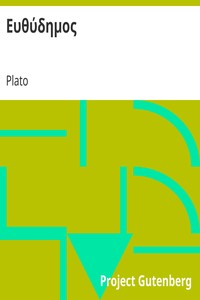Ευθύδημος by Plato
"Ευθύδημος" by Plato is a philosophical dialogue written in ancient times, likely during the 4th century BC. The work primarily engages in a discourse contrasting the teachings of the sophists, specifically the characters Euphridides and Dionysodorus, with the Socratic method, personified through Socrates. This dialogue satirizes sophistic rhetoric and raises questions about the nature of virtue and knowledge. At the start of the dialogue, we see Socrates conversing with Crito, who inquires
about Socrates' recent discussion in the Lyceum. Socrates introduces the sophists Euphridides and Dionysodorus, describing them as skilled dialecticians who have recently gained a reputation for teaching the art of argumentation. He reveals that these sophists claim to be able to teach virtue and knowledge effectively, prompting a discussion about their methods of teaching and the nature of the wisdom they profess to impart. This opening portion sets the stage for a humorous and critical examination of sophistry and philosophical inquiry, showcasing Plato’s characteristic blend of wit and philosophical depth. (This is an automatically generated summary.)
Read or download for free
| How to read | Url | Size | |||
|---|---|---|---|---|---|
| Read now! | https://www.gutenberg.org/ebooks/31402.html.images | 231 kB | |||
| EPUB3 (E-readers incl. Send-to-Kindle) | https://www.gutenberg.org/ebooks/31402.epub3.images | 124 kB | |||
| EPUB (older E-readers) | https://www.gutenberg.org/ebooks/31402.epub.images | 124 kB | |||
| Kindle | https://www.gutenberg.org/ebooks/31402.kf8.images | 237 kB | |||
| older Kindles | https://www.gutenberg.org/ebooks/31402.kindle.images | 226 kB | |||
| Plain Text UTF-8 | https://www.gutenberg.org/ebooks/31402.txt.utf-8 | 216 kB | |||
| Download HTML (zip) | https://www.gutenberg.org/cache/epub/31402/pg31402-h.zip | 120 kB | |||
| There may be more files related to this item. | |||||
Similar Books
About this eBook
| Author | Plato, 428? BCE-348? BCE |
|---|---|
| Translator | Grypares, I. N. (Ioannes N.), 1870-1942 |
| Translator | Harokopos, Aristeidis, 1851- |
| Title | Ευθύδημος |
| Alternate Title | Euthydemus |
| Note | Wikipedia page about this book: el.wikipedia.org/wiki/%CE%95%CF%85%CE%B8%CF%8D%CE%B4%CE%B7%CE%BC%CE%BF%CF%82_(%CE%B4%CE%B9%CE%AC%CE%BB%CE%BF%CE%B3%CE%BF%CF%82) |
| Credits | Produced by Sophia Canoni. Book provided by Iason Konstantinides |
| Reading Level | Reading ease score: 87.2 (6th grade). Easy to read. |
| Language | Greek |
| LoC Class | B: Philosophy, Psychology, Religion |
| LoC Class | PA: Language and Literatures: Classical Languages and Literature |
| Subject | Logic -- Early works to 1800 |
| Subject | Socrates, 470 BC-399 BC |
| Subject | Philosophy, Ancient |
| Subject | Sophists (Greek philosophy) |
| Category | Text |
| EBook-No. | 31402 |
| Release Date | Feb 25, 2010 |
| Most Recently Updated | Jan 6, 2021 |
| Copyright Status | Public domain in the USA. |
| Downloads | 201 downloads in the last 30 days. |
| Project Gutenberg eBooks are always free! | |

